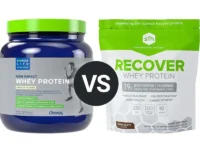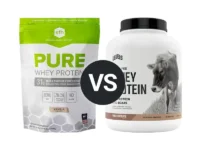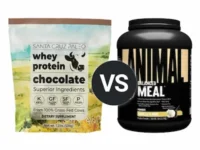Knowledge BaseYou're Questions Answered
BACK
Is it worth paying extra for artificial free protein powder?
Whether it is worth paying extra for artificial-free protein powder depends on individual preferences and health concerns. While artificial ingredients are generally recognized as safe by regulatory agencies like the FDA, some people may prefer to avoid them for personal or health reasons. Here are some factors to consider when deciding whether to pay extra for artificial-free protein powder:
- Personal preferences: Some people may prefer the taste of natural sweeteners and flavors, or may prefer to avoid artificial ingredients for ethical or environmental reasons. If you have specific preferences around the ingredients in your food products, it may be worth paying extra for an artificial-free protein powder that aligns with your values.
- Health concerns: While artificial ingredients are generally safe, some people may have individual health concerns that make them want to avoid them. For example, some studies have suggested that artificial sweeteners may be associated with an increased risk of weight gain, metabolic syndrome, and other health issues (1, 2). If you have specific health concerns related to artificial ingredients, it may be worth paying extra for an artificial-free protein powder to avoid these ingredients.
- Quality and purity: Some artificial-free protein powders may be formulated with higher-quality ingredients, or may be produced using more rigorous quality control standards, which could result in a higher quality and more pure product. If you are looking for a high-quality protein powder, it may be worth paying extra for an artificial-free option.
Ultimately, the decision to pay extra for artificial-free protein powder will depend on individual preferences and priorities. It's important to read the label and ingredient list carefully and to consult with a healthcare professional or a registered dietitian if you have specific health concerns or dietary restrictions.
Was this answer helpful? Let us know!
Like
References:
- Fowler SPG. Low-calorie sweetener use and energy balance: Results from experimental studies in animals, and large-scale prospective studies in humans. Physiol Behav. 2016;164(Pt B):517-523.
- Swithers SE. Artificial sweeteners are not the answer to childhood obesity. Appetite. 2015;93:85-90.
Add to this Answer
Your Answer
Do you have a suggestion to improve the answer? Please detail your suggestions and provide any references to information that may support your answer if available.
The content on this site has not been written, reviewed or endorsed by a medical professional. We assume no liability for the misuse of supplements and recommend you review the label of any product, as well as consulting with your health care professional.
We are a participant in the Amazon Services LLC Associates Program, an affiliate advertising program designed to provide a means for us to earn fees by linking to Amazon.com and affiliated sites.
We are a participant in the Amazon Services LLC Associates Program, an affiliate advertising program designed to provide a means for us to earn fees by linking to Amazon.com and affiliated sites.
© 2025 ProteinPowder.com


